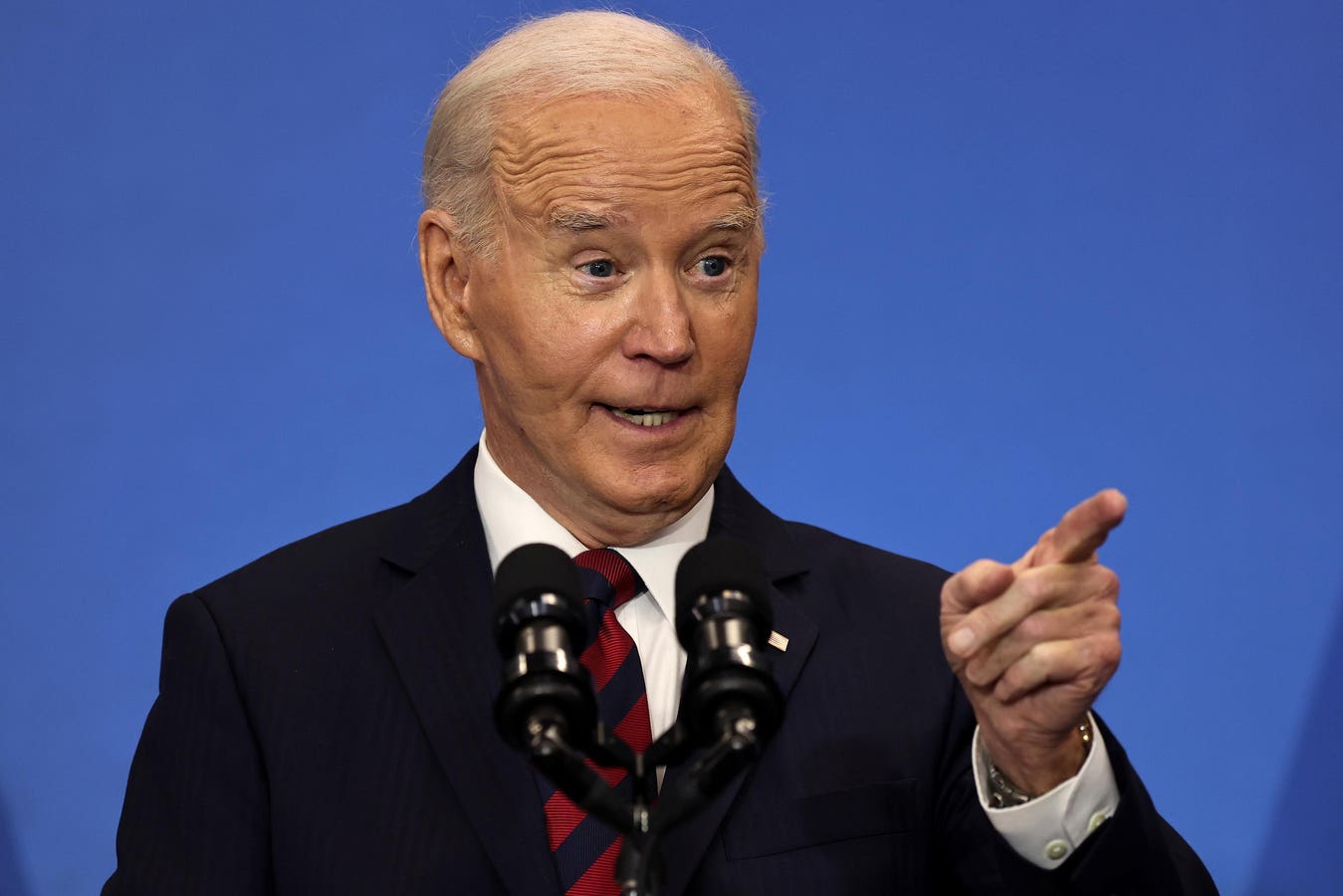Topline
President Joe Biden called for an end to stock trading for members of Congress in an interview slated for release this week, according to the Associated Press, endorsing a ban on the long-scrutinized practice that has not been voted on and remains standard practice for members of Congress.
Biden made the endorsement in an interview with A More Perfect Union. (Photo by Chip … [+]
Key Facts
Biden told non-profit news organization A More Perfect Union that no Congress members “should be able to make money in the stock market while they’re in the Congress,” according to a video interview seen by the Associated Press before its publication this week.
Biden said he thinks “we should be changing the law” around congressional stock trades, adding, “I don’t know how you look your constituents in the eye and know, because the job they gave you, gave you an inside track to make more money.”
The endorsement marks Biden’s most hardline stance on congressional stock trading during his time in office, as he has previously not taken sides on the matter and elected to leave it in the hands of Congress throughout his term.
Congress has yet to vote on a ban on congressional stock trading, though a bipartisan effort including Rep. Alexandria Ocasio-Cortez, D-N.Y., and former Rep. Matt Gaetz, R-Fla., attempted to push a ban last year that sought to stop members of Congress and their family members from owning or trading stocks.
The Bipartisan Restoring Faith in Government Act, which stalled before reaching the House, would require Congress members to sell any shares they own within 90 days of the act’s effective date or place them in a blind trust, as well as give members 90 days to release any shares they acquire in the future.
A similar bill to curb congressional stock trading was made in recent years by figures such as Sen. Elizabeth Warren, D-Mass., Sen. Steve Daines, R-Mont., and former House Speaker Nancy Pelosi, D-Calif., though it fell flat amid a lack of support from both parties.
Get Forbes Breaking News Text Alerts: We’re launching text message alerts so you’ll always know the biggest stories shaping the day’s headlines. Text “Alerts” to (201) 335-0739 or sign up here.
How Is Congressional Stock Trading Regulated?
Under the STOCK Act signed by former President Barack Obama in 2012, Congress members are allowed to make trades on the stock market so long as they disclose trades valued at more than $1,000 within 45 days. The disclosures must be made public, and apply to executive branch employees at the GS-15 pay grade (the highest level of salary for federal employees). Congress members are also prohibited from making trades based on insider information, though that provision has not resulted in any charges against a member.
Why Is Congressional Stock Trading Controversial?
Much of the scrutiny around congressional stock trading revolves around Congress members being privy to confidential information on matters that can potentially impact stock prices. In 2020, former Sens. Richard Burr, R-N.C., and Kelly Loeffler, R-Ga., denied using insider knowledge of the threat and spread of COVID-19 when they sold hundreds of thousands of dollars worth of stocks in January and February, before the pandemic was declared in March and sent markets reeling. Paul Pelosi, the husband of the former house speaker, garnered public attention in 2022 after making $5.3 million off Alphabet options before a House panel considered antitrust actions against the Google parent company. It appeared unlikely Pelosi violated any rules, as his options were set to expire the same day he exercised them. Nancy Pelosi denied accusations her husband traded on information she gave to him. In 2022, at least 97 members of Congress traded stocks or other assets that intersected with their work or committees, according to The New York Times. Probes into congressional stock trading date back several years, with a “60 Minutes” investigation finding some Congress members potentially benefited from trade moves made before the 2008 financial crisis.
Chief Critics
Sen. Mitt Romney, R-Utah, said last year implementation of the Bipartisan Restoring Faith in Government Act would “take some real work.” Prior to agreeing on more congressional stock trading restrictions, Pelosi said in 2021 Congress members “should be able to participate” in trading, telling reporters “we are a free market economy.” Sen. Tommy Tuberville, R-Ala., has also opposed a ban.
Key Background
Despite the rules in place around congressional stock trading, there has been scrutiny of how well congress members have followed them and just how effective they are. Congress members have been inconsistent with disclosing their trades, according to multiple outlets, and have regularly failed to submit filings on time or at all. Low fines for violating the STOCK Act have also been pointed out by critics, as congress members are supposed to pay late fees that start at $200 and rise with each infraction. There are also no public records of who has violated the act or received a fine, according to Business Insider. The STOCK Act is enforced by the Securities and Exchange Commission and the Justice Department.
Further Reading
AOC And Gaetz Push For Ban On Congressional Stock Trading (Forbes)



